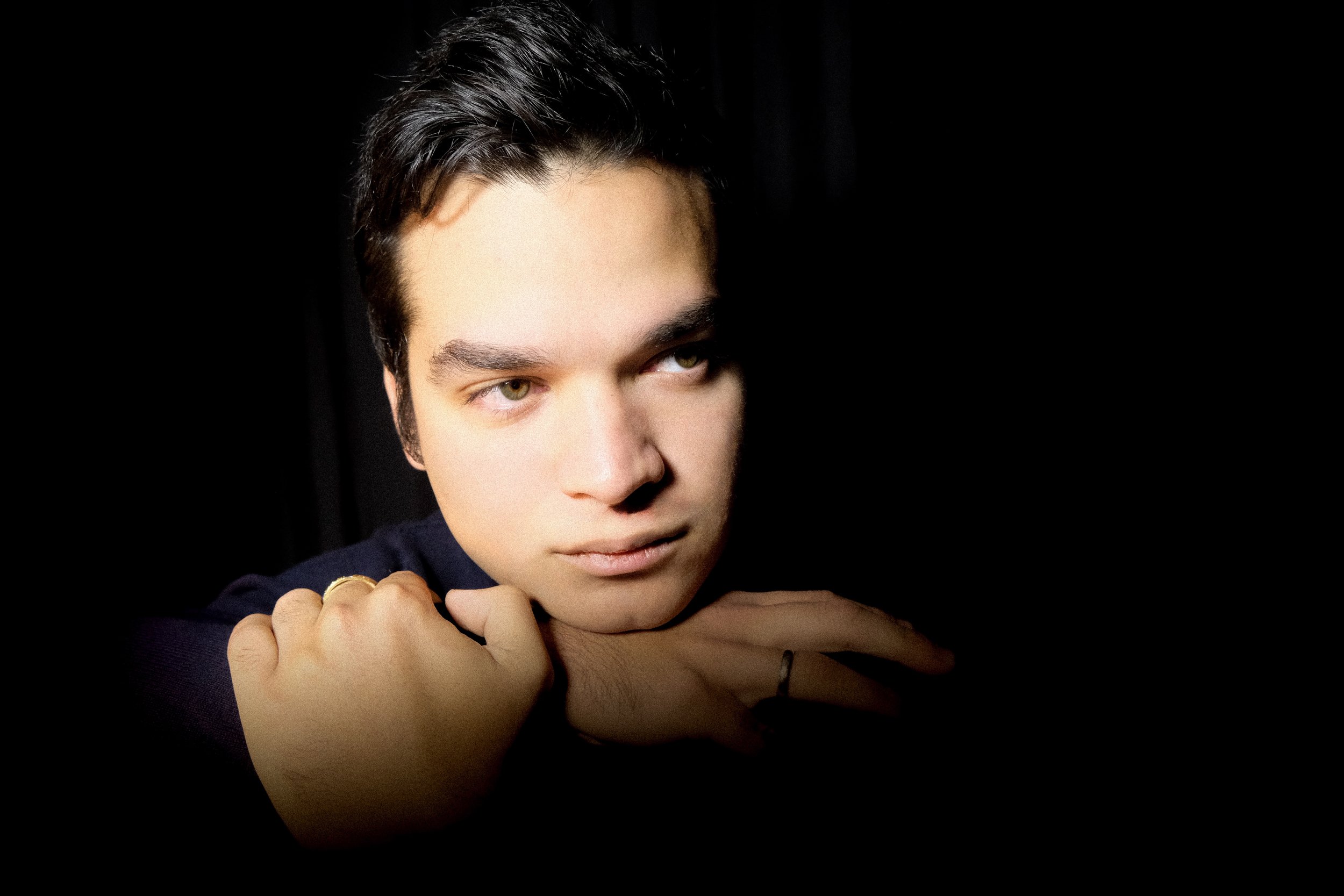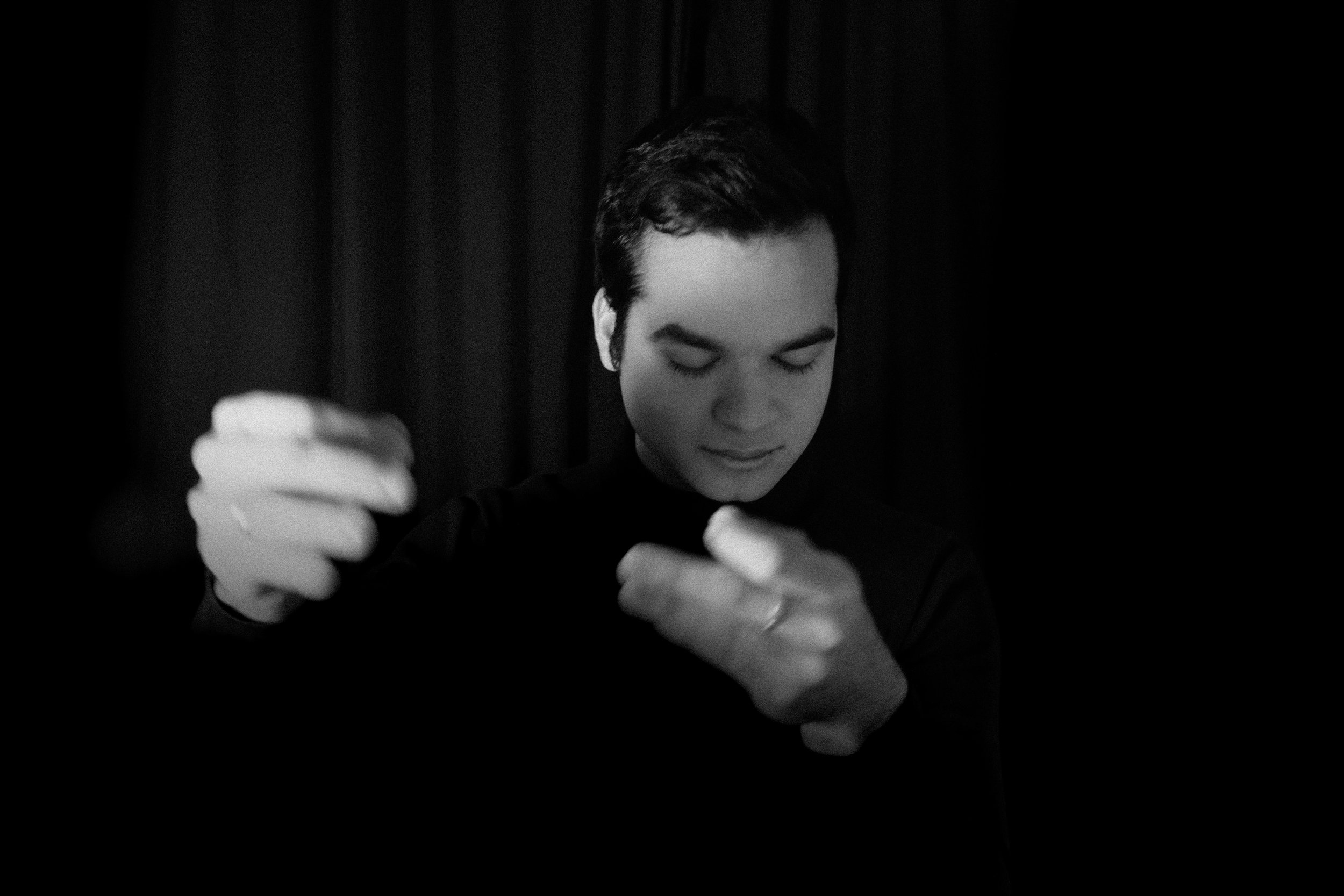Ahmed Alom:
Exilio
Release: June 02, 2023
Irreverence Group Music (IGM) presents Exilio, the solo album debut of New York based, Cuban pianist, Ahmed Alom. Featuring six Hispanic composers, each of whom lived in exile, the album pays a tribute to history’s great composers and the music that was produced out of a necessity to make a home somewhere new. Ranging across nations, generations, and political climates, Exilio offers a journey from past to present, maintaining a central theme of hope and support for those who carry the weight of exile on their shoulders.
Listen to Intermezzo No. 4
Ahmed Alom: Exilio
-
Format: Album
Release: June 02, 2023
Catalogue: IGM-038
GTIN/EAN/UPC: 4099885451546
Producer: IGM -
Ahmed Alom (Piano)
Rosario Armas (Mezzo Soprano) -
Isaac Albéniz
Luis A. Calvo
Ignacio Cervantes
Manuel de Falla
Ernesto Lecuona
Julián De La Chica -
-
Luis A. Calvo — Intermezzos
01. No. 1
02. No. 2: Lejano Azul
03. No. 3
04. No. 4
Ignancio Cervantes — from Danzas Cubanas05. Mensaje
06. Velorio
07. Ilusiones perdidas
08. Los tres golpesErnesto Lecuona:
09. La comparsa from Danzas Cubanas
10. En tres por cuatro from Danzas AfrocubanasManuel de Falla:
11. Canción
12. Cuatro piezas españolas : IV. AndaluzaIsaac Albéniz:
13. Recuerdos de viaje, Op. 71: VI. Rumores de la Caleta
Bonus Track:
14. De La Chica: Adiós Cuba (Feat. Rosario Armas)
-
Produced by Irreverence Group Music
Music by Isaac Albéniz, Luis A. CalvoIgnacio Cervantes,
Manuel de Falla, Ernesto Lecuona & Julián De La ChicaAhmed Alom - Piano
Rosario Armas - Mezzo SopranoRecorded, mixed & mastered by Greg DiCrosta
at Firehouse 12, New Haven, CT
Edited by Julián De La Chica
at IGMLab Music, Brooklyn, NY
Performed on Steinway “D” Hamburg (CD-79)
Piano Technician: Timothy J. RobinsonAlbum Notes by George Grella
Artwork/Cover: IGM
Photography by Julián De La Chica
Videos by IGMJulián De La Chica’s music is published
by Vagabundo Music Publishing, Inc. (BMI)
Manufactured and marketed
by Irreverence Group Music (Brooklyn, NY)
Made in US. Total time: 47 min
Ⓟ and © 2023 IGM

Music NOTES
By George Grella
Away from home for an indeterminate time—possibly forever—and likely alone, walking through unfamiliar places and trying to hold onto the sensations and comforts of memories, thinking of old streets while passing along new ones… In time, this new environment becomes familiar, and maybe has its own comforts, but it never feels like home. There’s a small hollow place in the chest that can only be filled by one thing: returning. But will that ever happen?
There is one word to define that state: exile. Speak it, and feel it. But what does it sound like? Because sound, especially music, is a part of exile. Walking those new streets brings out the sounds of home from memory, and the music, the tunes that are essential to the intimacy of home. This album from Cuban pianist Ahmed Alom—music of home he made while living in New York City, far away from his home of Havana—is the sound and music of exile, EXILIO.
Central to the album, in more ways than one, is Colombian composer Luis Antonio Calvo (1882-1945). In 1916, Calvo was diagnosed with Hansen’s disease (leprosy) and sent into internal exile in the town of Agua de Dios—where lepers were confined—where he spent the rest of his life and did the bulk of his composing. As a historical figure, Calvo encloses this album in a circle; contemporary Colombian composer Julián De La Chica—his Adiós Cuba is the final, bonus track on EXILIO—published a book, God’s Punishment (IGM-2022) that tells the story of the town and how Colombia used the patients as subjects for experiments (he has also developed an opera out of the story). And De La Chica is behind Irreverence Group Music, the imprint for this recording.
“There is a very deep connection I feel with Calvo’s exile, here in New York,” Alom adds.
He plays Calvo’s four Intermezzos, arguably the composer’s finest work, with warmth and care, channeling the uncanny combination of charm and emotional distance in the music. If not the, that is at least a prominent sound of exile, a combination of wistfulness and acceptance, a smile followed by arched eyebrows, looking ahead and knowing that there is a loss that can never be replaced. Feelings spike, then draw back, things settle, but in the end never completely fit.
There is, of course, Cuban music, not simply because that is Alom’s heritage but because Cuba, through wars and revolutions, is a disproportionate source of both important, vital music—especially vis-a-vis North America—and of people in exile.
The lives of Ignacio Cervantes (1847-1905) and Ernesto Lecuona (1896-1963) overlapped briefly, but they came from two very different periods of Cuban turmoil. For Cervantes, it was the revolutionary movement against Spanish imperialism—the composer raised money for the rebels and fled for his safety to Mexico and the United States. A fundamental figure in the development of a specifically Cuban compositional style, how wrote for the salon with the rhythms of dance. The selections from his Danzas Cubanas—a codification that taught these styles to international audiences—are the sounds of the past, his own and his country’s. The images are of parlors and small dance halls, people dressed for dancing, the rituals of social life.
Lecuona’s two dance pieces transmit the same ideas, but from the mid-20th century—the composer left Cuba for Florida in 1960, disillusioned by Castro’s new government. The grand En tres por cuatro bears itself proudly, fiercely holding on to memories, old lifestyles. Cervantes and Lecuona were exiled not just from their country but from its past, a land that none of us can ever return to.
Manuel de Falla (1876-1946) and Isaac Albéniz (1860-1909) are the two most famous names on this recording, and their exiles from Spain were very different. For the latter, it was perhaps voluntary—he was a popular musician, traveling and performing around the world, it was illness that caught him in France at the end of his life. His Recuerdos are instantly identifiable, even if his name escapes the thoughts this music has been heard before, it triggers the memory. The syncopated rhythms and lyrical interlude are equally sinuous, and like the impressionistic works of Debussy and Ravel they paint a picture of a place, once visited, now lingering in the past.
De Falla was another political exile, fleeing Spain after the Nationalist’s victory in the Spanish Civil War, settling in Argentina. He is perhaps the most important 20th century Spanish composer, and the aching elegance and simplicity of his Canción is a distillation of his art. Everything is just right, nothing is wasted nor excessive, with a minimum of materials, gestures, and even duration, it creates an entire world that is intense and unreachable, the unbridgeable distance adding to the power of the music. And while Calvo smiles through it all, the Cuatro piezas españolas try and dance through it all, or shout, or grit their teeth, Alom balancing determination against the trap of nostalgia. As Beckett wrote in a language other than his own, we can’t go on, we’ll go on.
De La Chica’s vocal work, arranged by Alom for this session for piano and sung by Alom’s wife, mezzo-soprano Rosario Armas, is about, as the pianist says, “what it means to say goodbye to Cuba, to your roots and everything.” The last piece on the album, it is not quite the last word, because all together the music is alive in the present, determined to face the future; Alom brings it here through his playing. He, then, should get the last words: “To me, exile represents a transformation, a movement, a direction. Rather than feeling nostalgia or pain because of the departure, for me it is a matter of having those feelings and looking forward towards universality, with movement and direction. That, for me, is exile.”
About the Author
George Grella is a composer, musician and critic. He's played CBGB and Carnegie Hall, is Music Editor at the Brooklyn Rail and a freelance critic at the New York Classical Review. He’s contributed to the Grove Dictionary of American Music and Musicians, The Wire, Downbeat, Bandcamp, NewMusicBox, American Record Guide, Playbill, Sequenza21, the Centre Canadien D’Architecture, Signal to Noise, Time Out New York, ClassicalTV, and others.
BTS | Interview
“His voice, [Alom] both as a migrant and as an artist, accounts for that spirit of resilience that shaped a large part of the work of composers such as Luis A. Calvo, Ignacio Cervantes or Ernesto Lecuona, in life circumstances that led them to find in the writing for piano a ground and a refuge to cultivate your introspection. I highlight that thread that links in such a coherent way the selection of musical works derived from those earthly and sentimental exiles, which were transformed into music through the creative exercise of the composers integrated into Alom's repertoire.”
— Luis Gabriel Mesa, PhD.
Doctor of Philosophy in Musicology from
the University of Granada (Spain).
Director of the Master of Music program at
Pontifical Xavierian University in Bogota, Colombia.

Ahmed Alom
Photo by Julián De La Chica
Reviews ● Notes ● Articles
Being exiled—en Exilio—can take many forms, and music is, often times, not only a vehicle of expression for those in exile but an exiled manifestation itself. Music travels, finds new homes, and can be forever repurposed. Like composers, music can have many lives and many afterlives. Luis A. Calvo, for instance, one of the composers summoned for this album, was indeed a composer in exile; exiled within his own country not for political reasons but for the cruelty of social prejudices, themselves supported by the law and, in the end, powerful enough to enforce an exile much more merciless than any political exile. Luis A. Calvo was a victim of leprosy, which in the early twentieth century was enough reason to condemn a human being to social death in a leper colony. But his music was also, in a way, in exile inasmuch as it was symbolically charged, inevitably, with the stigma of the disease. However, unlike Calvo and his fellow sick compatriots in “The Country of Pain,” his music could not be contained nor restrained. Even if symbolically exiled, Calvo’s music journeyed across nations and continents, and even across time. Ahmed Alom’s album Exilio is yet another testimony of these journeys, one distinctly eloquent, the musical voice of a myriad of ongoing voyages.
— Sergio Ospina-Romero, Ph.D.
Assistant Professor of Musicology at the Jacobs School of Music at Indiana University. Author of the book Dolor que canta. La vida y la música de Luis A. Calvo en la sociedad colombiana de comienzos del siglo XX.Going through the history of the Spanish and Latin American piano opens up a sound spectrum that oscillates between echoes of melancholy, drama and loneliness. At least there are three words that come to my mind when I hear Ahmed Alom's performance on his album Exile. His voice, both as a migrant and as an artist, accounts for that spirit of resilience that shaped a large part of the work of composers such as Luis Antonio Calvo, Ignacio Cervantes or Ernesto Lecuona, in life circumstances that led them to find in the writing for piano a ground and a refuge to cultivate your introspection. I highlight that thread that links in such a coherent way the selection of musical works derived from those earthly and sentimental exiles, which were transformed into music through the creative exercise of the composers integrated into Alom's repertoire. I also applaud his dialogue with creators like Julián De La Chica, whose life experience adds to that narrative line and leaves, in our hands, a production worth contemplating, from its past references to its contemporary sounds.
— Luis Gabriel Mesa, PhD.
Doctor of Philosophy in Musicology from the University of Granada (Spain). Director of the Master of Music program at Pontifical Xavierian University in Bogota, Colombia.In this production, the "minimalist" (not mannerist) interpretation of Calvo's four Intermezzos, stand out. Cuban pianist Ahmed Alom, offers a piano conversation between Luis A. Calvo, a Colombian composer victim of exclusion (he was exiled to the small town of "Agua de Dios", a detention camp for people diagnosed with Leprosy) and contemporary composers widely recognized (Falla, Albeniz, Cervantes and Lecuona), adding a current Colombian composer, Julián De La Chica, whose work and aesthetics respond to another historical and socio-cultural context. The memory of Cuba, however, seems to be an important axis in this album, which in its title refers to "exile", a term whose connotations are highly complex, and can lend itself to a broad debate. Being the solo debut album by Alom, I highlight his choice of works by Ibero-American composers, and his commitment to explore Calvo's work, proposing new perspectives for his performance.
— Susan Campos-Fonseca, PhD.
Doctor in music from the Universidad Autónoma de Madrid (Spain).
Professor at the Universidad de Costa Rica.This beautiful album is a moving tableau, performed with elegant phrasing, sumptuous sound, and deep commitment. Ahmed Alom is a wonderful pianist, and his generous focus on composers in exile shines a beacon of light on the plight and struggles of our humanity.
— Lisa Moore
Pianist (Australia)Alom’s album, Exile, couldn’t be more timely, coming at this period of unrest, amidst the surge of migrants leaving their homes to find a better life elsewhere. In the United States, as we are beginning to examine our own complicated and shameful past, the music on this album represents composers who were victims of oppression in their native lands. The works played, including lesser known compositions by Calvo, Cervantes, Lecuona, and De La Chica, are performed by Alom with great sensitivity and compassion. His nuanced sense of touch brings out the humanity and elegance of this music, which deserves to become part of the canon.
— Simone Dinnerstein
Pianist (USA)
Related VIDEOS
Press & LINKS
Exilio on Havana Times

